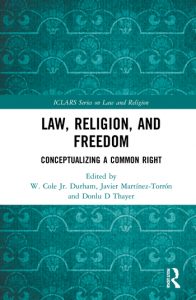Law, Religion, and Freedom: Conceptualizing a Common Right
The Routledge ICLARS Series on Law and Religion has announced the publication (February 2021) of Law, Religion, and Freedom: Conceptualizing a Common Right, edited by ICLRS

Founding Director Cole Durham and its former Publications Director Donlu Thayer, along with Professor Javier Martínez-Torrón of the University Complutense of Madrid, a member of the Center’s International Advisory Board. Thayer contributed the Intoduction, and Durham, Martínez-Torrón, and Center Director Brett Scharffs contributed chapters to the volume.
This book is one of two volumes developed from papers delivered at and conversations related to the fourth biennial conference of the International Consortium for Law and Religion Studies (ICLARS), held 8-11 September 2016 at St. Hugh’s College, Oxford University, and event co-sponsored by the International Center for Law and Religion Studies (ICLRS) of Brigham Young University Law School in the United States, by the Religion, Law and International Relations Programme of the Centre for Christianity and Culture of Regent’s Park College, Oxford, and by the University of Milan. The conference was organized with attention to the theme ‘Freedom of/for/from/within Religion: Differing Dimensions of a Common Right?’ This volume provides conceptual frameworks for and queries aspects of the theme, while the companion volume treats ‘emerging contexts’.
As this volume goes to press in late 2020, challenges to prevailing ideas about the relationships between governments and the religious freedom of individuals and the autonomy of religious organizations are being tested in the face of a global pandemic, with social repercussions unprecedented in the memories of many who are experiencing them. As a worldwide health emergency drives government policies of restrictions on behavior, it is particularly useful to review the foundations and implications of rights associated with freedom of religion and belief that have been critical over time in influencing relations between religious organizations and governments.
Description of the book from the publisher’s website:
This book examines major conceptual challenges confronting freedom of religion or belief in contemporary settings, bringing together chapters by leading experts from law, religious studies, and international relations who provide perspectives from both sides of the Atlantic. At a time when the polarization of ‘culture wars’ is aggravating tensions between secular and religious views about accommodating the conscientious claims of individuals and groups, and when the right to freedom of religion itself is facing misunderstanding and erosion, the work provides welcome clarity and depth. Some chapters adopt a primarily conceptual and historical approach; others analyze particular difficulties or conflicts that have emerged in European and American jurisdictions, along with concrete applications and recommendations for the future. The book will be a valuable resource for students, academics, and policy-makers with an interest in law, religion, and human rights.
Introduction
DONLU THAYER
PART I Definitions
1. What is religious freedom?
DAVID NOVAK
2. Freedom of religion: fundamental right or impossibility?
DAVID LITTLE
3. The politics of sovereignty: the early modern origins of
freedom of religion
KURTIS ANDERSON
4. The secularity of law and the freedom from religion
ZACHARY CALO
PART II Questions
5. Is reasonable accommodation sufficient protection for
the right to religious freedom in secular societies?
GEORGIA ALIDA DU PLESSIS
6. Is Hobby Lobby dangerous for religious liberty?
FREDERICK MARK GEDICKS AND ANDREW KOPPELMAN
7. Fernández Martínez v. Spain: an unclear intersection of rights?
JAVIER MARTÍNEZ-TORRÓN
8. Does the European Convention on Human Rights guarantee a
right to freedom ‘from’ religion?
GERHARD VAN DER SCHYFF
PART III Applications
9. Autonomy of religious communities versus the battle for human
rights: two sides of the same coin
MERILIN KIVIORG
10. ‘Christian bigots’ and ‘Muslim terrorists’: religious liberty in a
polarized age
THOMAS BERG
11. Managing religious diversity in Europe: legal implications of
religious affiliation and change of religion
MONTSERRAT GAS AIXENDRI
12. Laïcité, neutrality, and freedom of religion and conscience in
France after Charlie Hebdo: towards a nouvelle neutralité?
MARÍA JOSÉ VALERO ESTARELLAS
PART IV Predictions
13. Equal treatment of religions or differentiation between religions?
SOPHIE VAN BIJSTERVELD
14. The world-defining contrast between monism and dualism
and the future of religious freedom
BRETT G. SCHARFFS
15. Religious autonomy at the crossroads
W. COLE DURHAM, JR.